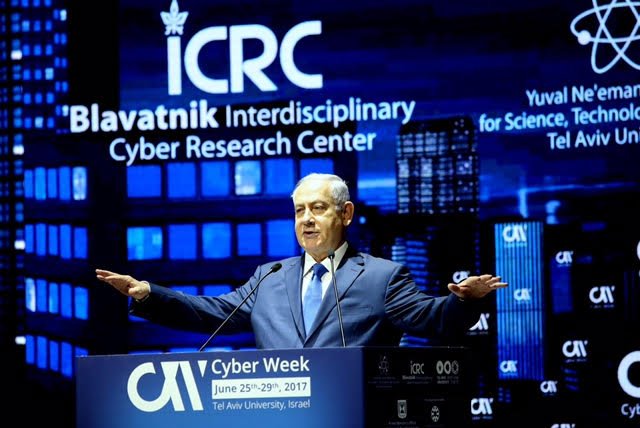“A few years ago I decided to establish Israel as one of the leading cyber countries in the world, and by all accounts, we’re there,” said Israel’s Prime Minister, Benjamin Netanyahu, in his keynote address today at Cyber Week Conference held at Tel Aviv University.
After this not so subtle self-congratulation, the PM went on to stress that the importance of cyber security should not be underestimated.
“We are experiencing every month dozens of cyber-attacks on the national level,” warned Netanyahu. “At any given moment, including right now, there are probably 3-5 attacks on the national level that emanate from various sources.”
Governments across the world are scrambling to pour time and resources into protecting themselves against the ever-increasing threat of cyber-attacks. With the rapid digitalization of society’s critical infrastructures, the damage that these cyber-attacks could inflict is frightening.
Cyber Week
Cyber Week brings together international cybersecurity experts and enthusiasts, from government, the private sector, academia, the military, and the intelligence community to provide insight into the latest global developments in cybersecurity.
The conference saw the announcement of a US-Israeli bilateral cyber working group by Thomas Bossert, Assistant to the President for Homeland Security and Counterterrorism in the United States.
The morning panel featured Gil Shwed, CEO of Check Point Software, Gen. (Ret.) Keith Alexander, Former Director of the NSA and CEO of IronNet Cybersecurity, and Nadav Zafrir, former head of Unit 8200 and CEO of Team8.
In his keynote address, Gil Shwed, CEO of Check Point Software, revealed the extent of the threat to both consumers and businesses.
“We are under attack not just in traditional attack vectors,” said Shwed. “Our mobile devices are a real backdoor into our lives – they are always on, 100 percent of the time, and when we are in our [business] headquarters it is connected to the public network and can broadcast what it sees.”
A survey conducted by Check Point revealed that in 100 percent of companies Check Point scans, there is already a mobile malware attack within their network.
Israel: A world leader
The serious threat of cyber-attacks is one of the key reasons why Israel is channelling so many resources into the industry. Already, a combination of a strong cyber defence authority, and high tech capabilities, means Israel is seen worldwide as a leader in cyber security.
“Most of the governments… in the world… want cooperation with Israel on high tech, and just about every one of them wants cooperation with us on cyber tech and cyber security tech,” claimed Netanyahu.
He labelled it as “an expression of change in Israel’s status.”
Sign up for our free weekly newsletter
SubscribeNot only this, cyber security also represents a significant business opportunity.
“This is a fast, geometrically rising market,” the Prime Minister stressed.
Israeli companies are already capitalizing on this business potential. The Prime Minister estimated that there were around 600 to 700 startups in the cyber security industry, and a significant amount of funding funnelled from abroad.
“In 2016, we had about 20 percent of global private cyber security investment around the world,” said Netanyahu.
Strengthening Cooperation: A US-Israeli Bilateral Cyber Working Group
The key theme of the morning panel was the need for international cooperation. Gen. Zafrir, Former Director of the NSA and CEO of IronNet Cybersecurity, called for countries to unite, saying, “Hyperconnectivity is bringing prosperity, we can’t go back and disconnect ourselves. Opportunities here far surpass the challenges and with the cooperation of governments, private sector, and academia “we will prevail.”
The conference marks an important milestone for cooperation between the United States and Israel on cybersecurity. Thomas Bossert, Assistant to the President for Homeland Security and Counterterrorism in the United States, announced in his speech the commencement of a US-Israeli bilateral cyber working group.
According to Bossert, “The group will work with an eye towards developing a different operational construct.” They will focus on preventative strategies to identify cyber adversaries before they threaten critical infrastructure. The group will be led by Rob Joyce, Special Assistant to the U.S. President, Cybersecurity Coordinator, and Dr. Eviatar Matania, Director General of Israel’s National Cyber Directorate.
Recognizing cyber security as “one of the biggest strategic challenges since 9/11,” Bossert emphasized the admiration that the U.S. has for Israel.
“There is a clear role for government in this work. Across the globe there are countries that can do this with greater success than others, and Israel is one of them.”
Bossert offered several thoughts about how nations should move forward with cyber security. Among these were the importance of bilateral partnerships and coalitions, the need for both incentives and deterrents to encourage cooperation, and the efficacy of partnerships between public and private sectors.
Leading the way forward
The conference is an indication of Israel’s commitment to cementing its status as a cyber security authority.
With such high-powered figures showing support for this, we are likely to see continued cooperation between Israel and the United States in this critical area, and a further strengthening of Israel’s status as a world leader.
Photo: Chen Galili
Related posts

Editors’ & Readers’ Choice: 10 Favorite NoCamels Articles

Forward Facing: What Does The Future Hold For Israeli High-Tech?

Impact Innovation: Israeli Startups That Could Shape Our Future





Facebook comments